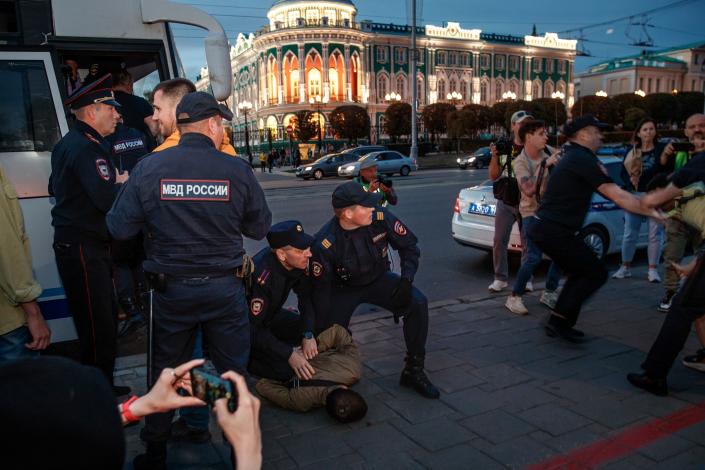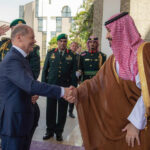INDIANAPOLIS – U.S. Sen. Sam Nunn was at a conference in Hungary when a coup d’etat toppled Soviet leader Mikhail Gorbachev in the summer of 1991. A Soviet contact called him. “You’ve got to get over here,” Nunn was told. “Big things are happening; great opportunities and huge dangers.”
Once in Moscow, Nunn would spend half a day milling around the Russian White House where Boris Yeltsin had made his stand. In the Duma, Nunn sat for two days in the gallery and watched the debate which would bring about the collapse of the Soviet Union, a stunning turn of events that, literally, no one saw coming.
“I combined that with having been so involved with the Vietnam War and knowing what happened when a country lost a war,” Nunn explained to me during a 2007 interview in Yekaterinburg during a congressional delegation with Sen. Richard Lugar. “I saw that Russia was unraveling and multiplied it by a hundred because we lost one conflict that was devastating to our psyche and military.”
Today, Nunn is co-chair of the Nuclear Threat Initiative, a private organization working to reduce nuclear and biological threats. He partnered with the late Sen. Richard Lugar to create the Nunn-Lugar Cooperative Threat Reduction Program, which would eventually secure and eliminate thousands of Russian nuclear, chemical and biological weapons.
On Monday, I interviewed Nunn in a week where Putin had a series of humiliations on the battlefield and received only tepid backing from Chinese President Xi. Indian President Modi lectured him on ending the war. And 18 local officials from Moscow and St. Petersburg had called on him to resign. “We, municipal deputies of Russia, believe that the actions of its President Vladimir Putin are harmful to the future of Russia and its citizens,” the public statement said. “We demand Vladimir Putin’s resignation from the post of the President of the Russian Federation!”
Is Nunn witnessing history potentially repeating? Could Putin face a similar fate as Gorbachev, or worse?
“We’re in the most dangerous period we’ve been in since the breakup of the Soviet Union,” Nunn said, comparing it to the Cuban Missile Crisis of 1962. “We have the threat of escalation, we have the threat of Russia bombing supply lines which would involve Poland and NATO. We have the increased dangers of cyber interference to command and control, (and) warning systems leading to blunder. The Russian invasion makes that all more likely. As you mention, we have the added danger of turning a nuclear power plant into a military base.
“It is a very dangerous time,” Nunn said.
On Tuesday in a delayed and prerecorded address to the Russian people, Putin issued a threat that, while aimed at a domestic audience, jangled nerves in the West while announcing a 300,000 man mobilization – Russia’s first since World War II. “To those who allow themselves such statements regarding Russia, I want to remind you that our country also has various means of destruction,” Putin said. “We will certainly use all the means at our disposal … It’s not a bluff.”
If there is to be a change of regime in Russia, it will most likely come in the form of a military coup, analyst of Russian politics Vladimir Juškin told ERR, adding “Russia is peculiar in that everything happens at a moment’s notice. And it can happen as an uprising, when the people no longer have food, or as a military coup, when the army sees it is being turned into the scapegoat and refuses to go along.”
New York Times columnist Thomas L. Friedman described a potential “cascading collapse” in the Russian military that mirrors Ernest Hemingway’s description of bankruptcy … “first slowly and then quickly.”
Konrad Muzyka, a defense analyst for Rochan Consulting, told the New York Times of collapsing Russian morale, “It is no longer science fiction to think that the war will end in a matter of weeks, months, and not years.”
New York Times Paris bureau chief Roger Cohen adds, “Mr. Putin cornered is Mr. Putin at his most dangerous. That was one of the core lessons of his hardscrabble youth that he took from the furious reaction of a rat he cornered on a stairwell in what was then Leningrad. His speech at once inverted a war of aggression against a neighbor into a defense of the ‘motherland,’ a theme that resonates with Russians.”
And then there is President Putin’s threat of using nuclear weapons, something Nunn now calls the “Putin Doctrine.”
“The theory of nuclear deterrence of the past made this type of intervention less likely,” Nunn said. “In the case of the Putin doctrine, if one makes both nuclear and conventional war, I think it’s a reckless addition to the previous theories of deterrence.”
“Barbara Tuchman wrote a book called ‘The Guns of August’ and she wrote another book called ‘The March of Folly: From Troy to Vietnam,’ which wasn’t as well known at the first one, but basically had 10 chapters of some of the worst decisions by leaders in the history that led to very serious disasters,” Nunn said. “I think if she were alive today she would write another chapter on Putin’s decision to invade Ukraine. I clearly think it is a march of folly. He’s made some very, very bad mistakes that are tragic for Ukraine, tragic for Europe, and extremely reckless and dangerous in terms of possible escalation.”
The columnist is publisher of Howey Politics Indiana at www.howeypolitics.com. Find Howey on Facebook and Twitter @hwypol.




This article originally appeared on South Bend Tribune: Vladimir Putin makes this a very dangerous time




